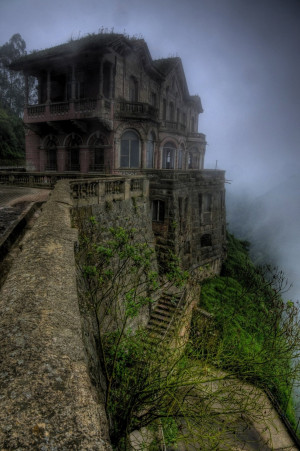Once upon a time there was a man driving along a straight lane just as it was about to get dark.
He knew where he was going and had friends waiting for him at the end, and the scenery on both sides was perfectly peaceful, but still he had a funny prickle at the back of his neck. He recognized the funny prickle. It always came when something was not quite right.
Still he drove on as the sun slowly set, and he tried to ignore the prickle.
(Silly, silly man. You should never ignore a prickle on the back of your neck. Your neck knows things that the rest of you can’t quite figure out. When it prickles like that, you should always turn around and change all of your plans. Always.)
Just as the last rays of sunlight were streaming across the road, the man’s car sputtered and turned itself off.
He drifted a ways and the rolled to a stop on the side of the road. Then he got out of the car, still ignoring the prickle, which by now was more like a jabbing under his collar.
He lifted the hood of his car. Nothing seemed to be wrong.
He closed the hood and straightened up, looking around for the first time. What he saw was quite odd.
As far as the eye could see stretched flat, neatly-clipped grass, marked off in giant rectangles by white paving stones. On the edges of each rectangle, small cone-shaped hedges grew, each one surrounded by its own tiny fence. This pattern was repeated over and over with eery consistency off into the distance.
Rubbing the back of his neck and refusing to worry, the man took out his cell phone to place a call to his waiting friends.
The phone was dead, and no amount of button-pushing or power-cord-plugging-in could make it come to life again.
The man no longer felt that he could ignore his prickling neck, but he also no longer felt that he had many options left to him. His car would not move. His phone would not work. There were no other living beings anywhere at hand.
(Silly, silly man. There are always options. Sometimes you just have to look harder to find them.)
The well-manicured look of the landscape suggested that people did live nearby, though. After all, someone had trimmed those hedges and put up those fences and cut that grass so low.
With no other option that he could see, the man and his pricklig neck began to walk down the white paving stones away from the road and (he hoped) toward some sort of house where he might find help.
He walked a very long time, past a great many curiously precise grass rectangles and even more oddly perfect cone hedges.
He walked a very long time.
And eventually, he did see a house. Or what he thought must be a house.
The building was perfectly white and perfectly rectangular and each of its four corners touched the edge of a smaller building, perfectly black and perfectly cone-shaped. The man had never seen anyplace so strange. There was a large front door in the exact middle of the white rectangle, but no windows that the man could see.
With a great deal of prickling in his neck but still no other options, the man went to the big front door and knocked.
Silently, the door opened. The man was blinded by the light that poured out into the night but he heard music from inside, so he didn’t hesitate long before stepping inside.
“Is anyone home?” he asked.
The door shut behind him.
The man’s friends wondered why he didn’t arrive that night, but they didn’t begin to be worried until the next day when he didn’t return anyone’s calls. They drove down the long, straight lane, all the way to his home in another town, but they never found any sign of him or his car in all that peaceful landscape.
And they never saw him again.

